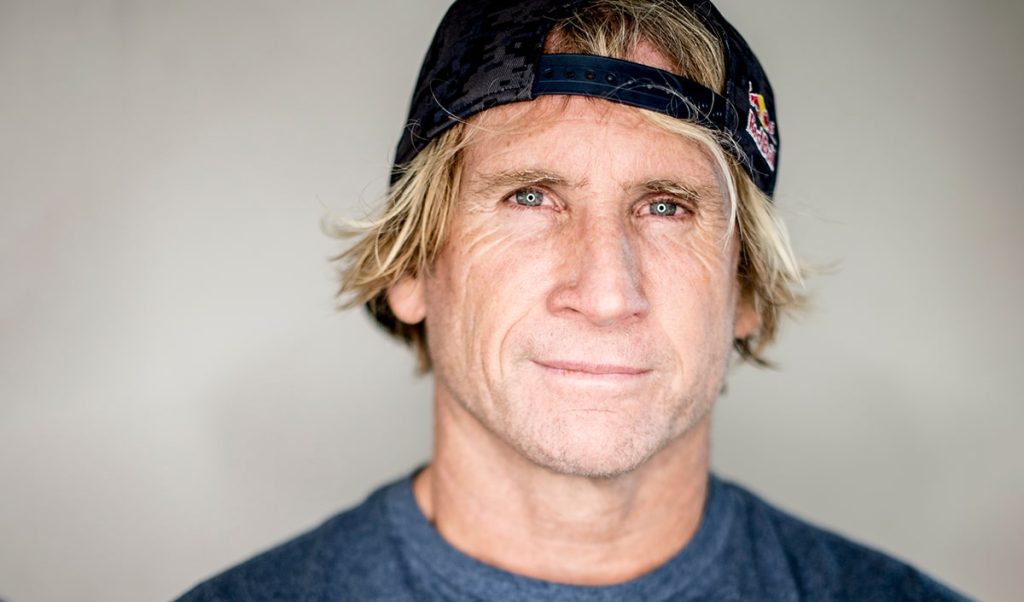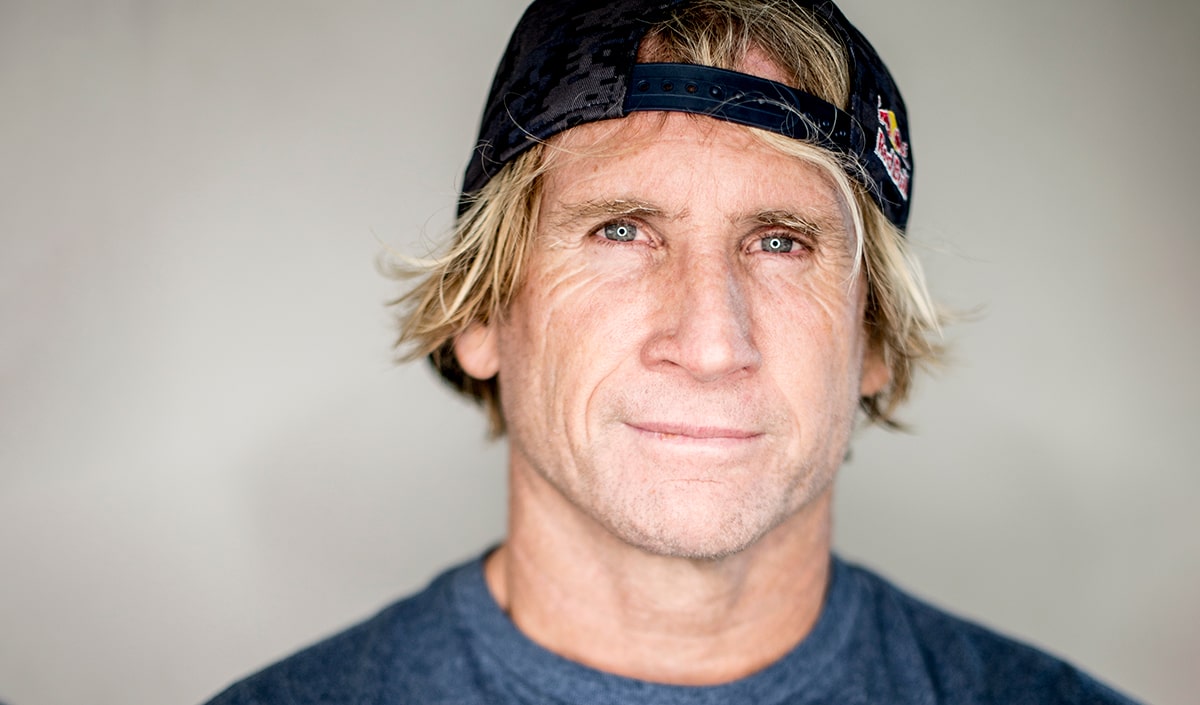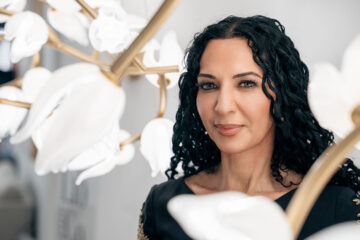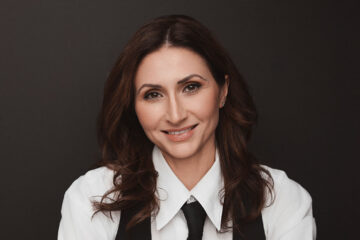Robby Naish: “The Ocean Is My Playground More Than My Home”
Catching the longest wave has been Robby Naish’s lifelong mission: “I want to ride one single wave as long as it goes.” In his latest project, we witness his journey finding purpose beyond his career on water, and his accepting that just like a wave, life is finite.
We spoke with Robby Naish about his legendary windsurfing career, and latest project, The Longest Wave, a documentary by Oscar-nominated and Emmy Award–winning filmmaker Joe Berlinger. In an intimate cinéma-vérité style, Berlinger captures Naish on his transition from competing, to life after professional sport. “It’s an unbelievable environment to be able to go and play in and be challenged by. It’s always evolving and changing and it never gets boring. But I also really love coming back to the land. The last thing I’d want to do is get on a boat and sail off into the sunset.”
Q: In the trailer, you said, “I’m more of a dreamer than a goal setter.” Can you tell us about how this motto has carried you through life until where you are now?
A: It was more being retrospective when asked. And when I observe and read how other people approach things, if you read quotes from successful people, usually their number one thing is goal setting. And I’m always sort of pondering, well that’s kind of weird because I’ve never looked at things that way. So, it was never a plan. It’s not like to set out to say, “OK, I’m not going to set out goals for myself, I’m just going to see what happens and wing it.” It’s just an honest assessment of how I’ve sort of meandered my way through life. I guess it’s more because of the luck that I’ve had to have the career that I’ve got, to be doing the things that I’ve been lucky enough to get paid to do for a living, where planning and goalling would be very tough because a lot of the things that I’ve been involved with didn’t exist until I started being involved with them. I’m not the kind of guy that sits down at my desk and says, “OK, I want to think of the next best thing.” Even in business, I just don’t work that way. My brain doesn’t work that way. I just kind of see what happens, wing it. But so far, so good! I guess it’s not the way you would recommend most people to do things, but for me, it’s worked really well.
Q: Do you ever think of the circumstances/family that you were born into that allowed you to have the opportunity to pursue extreme sports? How have your parents/family viewed your career and supported you over the years?
A: The older I get the more I appreciate how lucky I am to have come from where I came from, when I came from there and how I came from there and how my parents raised me and continue to guide me. Luckily, both my parents are happy and healthy, and they’re together. My dad’s going to be 81 this year and my mom’s only a couple years younger, and they’re still going full on. They’re going on cruises, and they just went to Greenland on a cruise, and they’re about to go on another somewhere. My dad’s a snowboarder. He still goes snowboarding by himself. He rides a motorcycle. My mom teaches Pilates five days a week, so they’re still totally living life to the fullest.
As a kid they really gave us independence. It was a very different time then. There were no cellphones. My parents had no idea where we were when we were little kids. We’d get home from school, and off you went and it was fantastic. Even once my career started, the fact that they let me do that, independently, on my own, was amazing. Travelling on my own to the other side of the world as a kid, not just once — it was the Bahamas in ’76, Sardinia in ’77, Cancún in ’78, and Greece in ’79, and back to the Bahamas in ’80. And all of those unchaperoned, and it certainly helped to give me independence and self-confidence. Then through my professional career my parents were there as well.
My dad quit teaching high school in 1980 and started making boards full-time in about ’77. He started making windsurf boards in the garage. We were riding together and surfing together. He started windsurfing about a year after I did and he ended up quitting teaching high school and making windsurf boards full-time, and opened a business in ’79. Through pretty much my entire professional career, my dad was making my boards and I always had the best equipment. I ended up becoming sponsored by a big European brand. My dad ended up working for them and making all their boards, and so there was that sort of, not business relationship, but really close relationship with my dad because of doing the boards together for decades. Then once the sport turned pro, he was going to one or two events per year through the ’80s because he made boards, not only for me, but the whole team. He got to experience it and again, we worked really closely on my equipment together, which was really cool.
Q: You say that access has changed so much now because of the Internet. You said there’s no mystery anymore. That before, you used to get off a plane and cross your fingers that there’d be wind and waves. That there’s so much more information now and that the world is a tiny place compared to what it used to be. Do you prefer the access to information, or was part of the thrill, part of being an adrenaline junkie, the fact that there was a little mystery involved?
A: If you’re young these days, there’s a lot more information everywhere at your fingertips. There’s still going to be mystery. You still don’t know exactly what you’re going to get. But say you’re going on a holiday. For most places, you’re going to have a pretty good idea of where you’re going, right? You’re going to have an itinerary because most people look it up and say, “Let’s go to this museum, and let’s go eat at this restaurant.” It’s like you’d have your whole trip planned out before you even go and you know what it looks like and you know where it is. There’s still mystery, I guess, once you get there, even though you’ve read the menu before you even went on the trip, to see if you were even going to like the food at the restaurant. That’s how some people work. I don’t. I still want to walk up to the restaurant and read the menu through the window and see if it looks good. But it certainly changed the dynamic compared to the days when you had no clue. You didn’t know. Is it a reef break? Is it a beach break? How cold is the water going to be? Oh shoot, I thought it was going to be warmer; I didn’t bring a big enough wetsuit. There was just a lot less information available. You’d have to go get the encyclopedia and read and go, “OK, temperatures in Greece in February, OK yeah, looks like it’s going to be in the 70°s, I better bring a long-legged wetsuit.” It’s just really different now. In some ways it’s amazing. There’s just so much information available. Everything is available.
When you tell people that are younger that the world just wasn’t always that way, they don’t even get it. Like you didn’t even know where you were going? Or telling people about driving before GPS and folding out those maps. I’d be driving around in Europe, trying to get from northern Germany down to an event in Holland, for example, and taking the wrong road and ending up at a border and being like, what? Opening the map and you’re trying to drive and trying to read the map and figure out where you’re going. It was just very different.
Q: It’s almost like there’s a lost charm in it?
A: Oh, there’s a massive amount of lost charm in it. There’s certainly too much of a good thing and a desire to make ourselves more efficient, to make our time more efficient, and to create more and more and more apps and things to make our time efficient. It’s basically sucking all of our time away completely. You’re way way busier now than before because of all this information that’s available.
The best thing people can do these days when they get home from work is put their phone in a lockbox and just live their life for at least a few hours of the day. I mean that’s what’s so good about surfing, windsurfing and kitesurfing. You completely unplug; you disconnect from that stuff for a while. You get out on the water and you actually live your life. You think. Your brain can actually think instead of constantly being engaged with something.
Every time people are on their phone, they’re like, “OK, I got to do this, I got to do that, this is how I’m going to entertain myself,” and it’s insane. It’s information overload and you do lose a bit of yourself in that. I’m watching my 14-year-old daughter trying to navigate her way through being a teenage girl and it looks very difficult because so much a part of your life is that constant communication and information. I mean you’re doing your homework on the computer, you’re socializing on the computer, you just can’t get away from it.
I think it’s so important to get away from it. And then the more I encourage her to do that, the harder it is because she feels like she’s not going to have any friends if she doesn’t answer her texts. It’s just constant. I don’t have any notifications on text.
I don’t have a ring on my phone. I don’t have any announcements on Facebook or Instagram or anything because I don’t want that stuff bothering my brain all day. But for someone that’s grown up in that, I’m sure it’s not as easy as it is for me, who can just disconnect from it because I lived in that time when we didn’t have it. I feel really lucky that I did have a real life without technology, because it was pure, it was better. I hate to say that: “Oh, life was better in the old days.” You always hear old people saying that, and there’s incredible benefits that have come with that technology, but I think this also sucked the life out of us.
Q: What’s your relationship with the ocean and the water?
A: It wasn’t really so much love for the ocean. It was the love for the activity. It was the selfish desire to keep playing and challenging myself. The ocean is my playground more than my home. I’ve always said that. I’m not a real waterman. I don’t like being on boats. I get seasick. I don’t like being underwater much. I like being above water. It’s an unbelievable environment to be able to go and play in and be challenged by. It’s always evolving and changing and it never gets boring. But I also really love coming back to the land. The last thing I’d want to do is get on a boat and sail off into the sunset. I’d rather shoot myself than do that, literally. There’s a point at which there’s too much water.
It’s a big big part of who I am and that’s where I’ve been able to escape. It’s been where I’ve been able to clear my head. It’s just being able to just get out and centre I guess you could call it.
I mean the ocean is cleansing, which is why I so encourage people, even if it’s just stand-up paddling on a little lake in your hometown, getting out on the water is really good for your mind, body, spirit. I’ve been lucky enough to spend an awful lot of time on the water, so I know I’m really lucky to have had all those experiences.
Q: Berlinger is known to have a very specific type of profile when it comes to his chosen subjects. Common traits across the chosen subjects chosen by Berlinger include attention to detail, a desire to succeed, the need for excitement, ability to keep a clear head and an unrivalled aptitude to manage stress. Do you believe you fit his profile?
A: I think I was certainly born with an odd personality. I was a really weird little kid. I’m very self-driven, very independent. I think that’s helped me through the sports that I’ve been involved with that require a lot of independence. I mean I was travelling on my own. You know, you don’t have a pit crew of guys helping you with all your stuff. You were travelling around the world with 300 kilos of gear. Rent a car, pile it on top of the car, drive five hours to the coast, get all your stuff together. You had to be pretty self-driven, or at least the more self-driven you were, the better off you were.
Joe’s different. I watched his films and I just imagined the complexity of how he can juggle all of these different things, and how do you have that story in your head and then you take all the pieces and you film them and you weave them. Not so much in The Longest Wave. The Longest Wave is a bit out of his wheelhouse. It still ended up being a pretty in-depth, complicated, interesting story for an action sportsfilm. That’s what’s unique about it. I didn’t just want to make some normal sports movie, and he really did that. But if you watch some of his other stuff, you’re like, “How did he even get these interviews?” You end up watching a film and you’re like, well, “Which side am I on? Is he the bad guy or the good guy?” Just incredible depth of editing where my brain’s not that good at juggling so many things. It’s just incredible. I imagine his office must have millions of those little sticky notes all on the wall, and he says, OK, “I’m going to take that interview and it goes there, and that interview and it goes there,” and then he’s going to weave this story that he has in his head. Very very impressive because it’s so different from the way that I would be able to approach things.
Q: You say that The Longest Wave is about time, the concept of dealing with time and how we deal with time as we age. There’s something so melancholy about thinking about time and the time we have left and how we’re spending it on this beautiful Earth. How has your concept of time evolved over the years? How do you view time now and how would you like to spend the rest of your time on Earth?
A: It’s so funny because everyone, I’m sure, has older people in their lives telling them when you’re younger to “enjoy every moment because time goes fast.” You know that kind of thing. And it’s true, the older you get the faster time seems to go and I think it’s because every single day, every minute, every second, every year becomes a smaller percentage of your overall experience the older you get. Every single day used to be 1 per cent of your life. It’s faster when it becomes 1,000th of your life, and it’s not easy especially given the complexity that life, at least for us in the West, has become through technology and all these things to help us be more efficient with our time, and to be busy and stay connected.
It really does suck a lot of the idle time that allows you to really sit back and think and go, “OK, is this who I want to be and what I want to do?” That reflective time we used to have more of is kind of gone, or seems to be at least in short supply now and I think it’s probably easy in that situation to wake up and be like, “Oh my God, three years have just gone by. What did I do?” Frantically running around chasing my tail, doing whatever people do.
“Life is beautiful. Life Is such an incredible Opportunity, such A gift…I always say Life’s what you make It, make it a good one. You never know how Long you have here, So love hard, play Hard, work hard”
For me now, I’m just trying to slow it down. It’s probably better than it is for a lot of people because I have a life where I can kind of still, even though I have a lot of balls in the air, I can do what I want today. If I don’t want to go to work, I’m not going to go to work. If I want to go kite, I’ll go kite. If I want to windsurf, I’ll go windsurfing. If I want to fly to visit my family, I can do it, so there’s nobody telling me what I have to do, which allows me a lot more flexibility in managing my time, and it’s still hard. For someone who has limited time, you have to work. Your boss tells you you have to be there at 8 a.m. until 6 p.m. You have to work overtime. I think it must be even more challenging because your time isn’t even, to a large extent, in your control. The free time that you have is limited and then there’s a lot of things asking you for that free time and so you’re trying to fi t a lot into a limited amount of available time space of … I don’t know, I think if you went back 100 years, days probably seemed a lot longer and years probably seemed painfully long. Even back 500 years, time probably didn’t move at all. And now because we’re so busy and we have so much going on, time is really fast so you got to try and slow it down and enjoy it, savour it and make sure you actually want to use it the way you want and not wake up and go, “Oh my God, that’s not what I wanted to do, but I already did it.”
Q: Would you consider yourself an adrenaline junkie?
A: Yes, but not with reckless abandon. With calculation. There’s a difference. I’m not one of those guys that would want to jump off a building with a wingsuit.
Q: What has been your greatest victory in life so far?
A: I wouldn’t say one single moment, or event, or thing. At this point, probably longevity. The fact that I’ve been able to do what I’ve been doing for as long as I’ve been doing it is a pretty good victory. I really wanted to do this and tried myself up to have it last another year. “Maybe I can last another year? It would be great if I could make it last another year.” I’m 58 and I’m still making it last another year.
Q: What is one thing you always want your children to know?
A: That I love them to death. Love them, love them, love them.
Q: What age do you wish you could permanently be?
A: Right now is pretty darn good. I haven’t had any real bad ages. Maybe a tiny bit younger than now because I’m still scared of getting older right now and slowing down, and waking up and getting a little sore. I’d take it right now. I’d stay at this age. Selfi shly, a year or two younger, but every year’s experience adds wealth, knowledge and appreciation, so I wouldn’t want to say 30 or 40 or 50 because I think I’m wiser and smarter to live better right now than back then. If it was just the physical age I was choosing and not the mental capacity, I’d go younger. If I could have the knowhow I have from today in my 30-year-old body, I’d probably do that, but if I had to take the whole thing as a unit, right now.
Q: What does la dolce vita mean to you?
A: That life is amazing. Life is beautiful. Life is such an incredible opportunity, such a gift and what you make it. I always say life’s what you make it, make it a good one. You never know how long you have here, so love hard, play hard, work hard, and again you don’t know how long you have. Some people unfortunately don’t have a lot of time here, and make all these plans for the future, and then unfortunately, for whatever circumstances, that doesn’t come because it’s cut short for things maybe completely out of your control. Life’s not fair sometimes. So yeah, live hard, live well, as well as you can, and be super optimistic and give yourself as much opportunity for good luck and good health as possible. I don’t drink. I don’t smoke. I don’t do drugs. I’m not walking around in a plastic bubble being protected, but I live smart because I want life to be as rich as possible.
The film is available only on Red Bull TV, a free, on demand streaming service available on the web and as an app across devices big and small. Watch the premiere here.




























































































